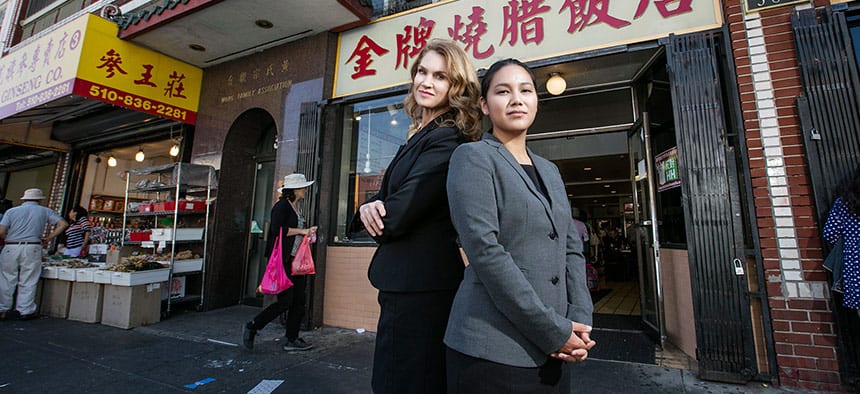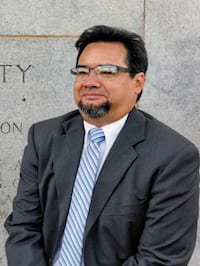
By Andrew Cohen
Laura Lane ’96 has represented low-income tenants in the East Bay for nearly 20 years. During all that time, she never saw a landlord go this far to drive out tenants as she did recently at a low-income residential hotel in Oakland’s Chinatown.
“I’ve seen a lot of neglect, but I’ve never seen a landlord so intentionally make a property uninhabitable,” said Lane, the housing practice director at Berkeley Law’s East Bay Community Law Center (EBCLC). “These are rent-controlled units that the new owner wants to convert into more expensive housing for tech workers. He thought he could buy the property and force long-term tenants out by removing fixtures that are necessities for living like toilets, showers and a kitchen. The conditions clearly show an effort to make it impossible for the current tenants to live there.”
Most residents at the Fremont—a single-room occupancy hotel—share common bathrooms and kitchens. A few months after buying the building last fall, Green Group LP gutted four bathrooms and one kitchen, leaving the 40 rental units to share just two bathrooms and a single kitchen.
The tenants are all low-income Chinese immigrants, and all but one speak little or no English.
After being contacted by the Asian Pacific Environmental Network, a community organizing nonprofit in Chinatown, Lane and clinic student Lindsey Quock ’17 sprang into action—organizing tenant workshops, visiting the building and gathering information.
“I was so lucky to have Lindsey’s help on this,” Lane said. “First, she speaks both Mandarin and Cantonese. Without her, it would have been much harder to gain the tenants’ trust because of the language and cultural barriers involved. Second, she’s a real superstar who goes the extra mile. She organized tenant meetings, recruited Chinese-speaking LL.M. students to meet with tenants individually, and prepared an extensive memo about the property with a detailed timeline and photos.”
Jumping right in
When one frustrated tenant withheld rent in protest over the conditions at the property, Green Group LP filed an eviction lawsuit that EBCLC agreed to defend. Quock’s extensive role included—after some tutoring from Lane and fellow EBCLC housing attorney Marc Janowitz—deposing one of the building’s property managers.
“First deposition I’ve ever taken,” Quock said. “It was exhilarating. Laura and Marc taught me how crucial it is to maintain your composure, stay calm, truly listen, be over-prepared and create a clean record. They reminded me that long pauses are okay—you don’t want ‘ums’ and ‘ers’ being recorded. The experience really lifted my confidence.”
In addition to her legal tasks, Quock served as a vital source of comfort and communication with the tenants. “I’d text with them, talk to them on the phone and translate during their individual counseling sessions,” she said. “It was a challenge to convey legal concepts in another language and work through the various additional hurdles that low-income tenants and immigrants must overcome to access the legal system.”
After a four-day jury trial conducted by EBCLC Attorney Ubaldo Fernandez ’13 and Lane, the jury returned a verdict for the defendant, finding that the property had zero rental value in its current condition and that the tenant need not pay rent until the bathrooms and kitchen are restored.
“It’s a great victory for our client,” said Quock, who was part of a tenants’ union before law school and hopes to work on housing and anti-displacement issues in her native Bay Area after graduating. “It also lets tenants in similar situations know that they have rights and that EBCLC can represent them if they get an eviction notice—and that it won’t be easy for a landlord like this to prevail.”
The road ahead

In addition to helping their client, Quock and Lane met with members of the Oakland City Attorney’s Office and with Robert Salinas ’96, of Sundeen Salinas & Pyle, and persuaded them to help the Fremont’s other tenants. Salinas and the city teamed with the Asian Law Caucus to file suit seeking injunctive relief and damages against ownership and management, on behalf of 14 tenants, for violations of Oakland’s Tenant Protection Ordinance and other claims.
“It’s great to work with EBCLC, an organization I’ve collaborated with at different points over the years,” Salinas said. “Laura and her team did a superior job.”
After issuing a tentative order demanding that the bathrooms be immediately repaired, the presiding judge visited the hotel to assess conditions. He described the developer’s conduct as “unbelievably callous” and prohibited any more actions aimed at driving out tenants.
A successful outcome stands to prevent hundreds of evictions of Chinatown residents while sending a powerful message to developers who try to ignore rental protections. For Lane, the case fuels EBCLC’s two-prong mission of helping aggrieved, low-income clients while also advancing systemic reform and far-reaching change. The center’s dedicated teams of attorneys and students have led to its growth as the East Bay’s largest provider of free legal services.
“It’s very rewarding when a case you’re working on leads to benefits that extend to a broader group of people,” Lane said. “We established relationships, helped organize a tenants’ association and provided access to the judicial system to community members who previously knew nothing about their rights. That all happened largely from the work Lindsey did to help not just our client, but all the tenants at the property.”